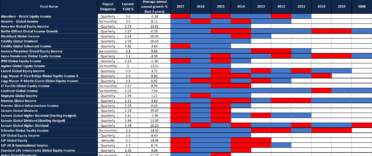 What are investment trusts?
What are investment trusts?
An investment trust (sometimes called an investment company or simply a trust) is a company whose job is to invest its capital to generate returns for shareholders. It usually does this by holding shares in other listed companies, although it can also buy other types of assets such as bonds or property. A trust usually makes its shares available for retail investors to buy.
Investment trusts are similar to investment funds (also called unit trusts, open-ended investment companies, and other names – but for the sake of this article called simply funds) in that they allow a regular retail investor to easily buy a managed portfolio of diverse assets in a single investment.
How do investment trusts work?
When you invest in an investment trust, you buy a share in it. That share represents a slice of the value of the assets that the company invests in, similar to when you buy a unit in a fund. These shares can increase in value as the value of the underlying portfolio of assets grows. This is called capital growth. As a company, a trust will often also pay out a portion of its profits to shareholders in the form of a dividend.
What’s the difference between an investment trust and a unit trust?
Trusts have some similarities to funds, which are the more mainstream way for consumers to invest. However, there are some important differences to keep in mind that make investment trusts a slightly different investment option.
Investment Trusts explained
Investment trusts are ‘closed-ended’. This means they comprise an unchanging number of shares (because they are a company – shares in a trust are like shares in any other listed company). However, as with any other traded company, their shares can go up and down in price according to supply and demand. Share prices can be affected by things like investor sentiment – for better or worse. However, this also means that trust managers aren’t forced to buy and sell assets to satisfy investor demand. The decision to buy and sell rests solely with them.
Unit Trusts explained
Unit trusts or funds are ‘open-ended’. This means they can create and destroy units (investors purchase units in a fund) as needed to accommodate money flowing into and out of the fund. While this means investors will always be buying units at a price approximately equal to the value of the slice of assets the unit contains, it also means fund managers can be forced to sell shares at a bad price if investors pull their money out – or buy shares at an inflated price if investors demand it.
What are the benefits of investment trusts vs unit trusts?
- Competitive pricing - previously, investment trusts were generally less expensive than unit trusts, because unit trusts would bundle the cost of commission paid to financial advisers into their annual charge. However, since new rules banned adviser commissions, investment trusts have largely lost this pricing advantage.
- Shareholder rights - because when you invest in a trust you do so by buying its shares, you gain the shareholder rights available to any other shareholder, just as you would with another listed company. This means you can attend company AGMs and cast votes where applicable if you are interested.
- Income - one appealing benefit of investment trusts is their focus on income. Trusts can distribute profits to shareholders, just like any other listed company. Unlike with unit trust funds, however, trusts have the right to withhold up to 15% of their annual dividends to keep for another year. This creates a smoothing effect on income generation – so in theory you won’t be quite as vulnerable to fluctuations in dividend payouts from one year to the next. Check out our podcast episode 241 where Damien explains 'How to use investment trusts to build an income portfolio'. It is also worth checking out podcast episode 437 where Damien explains what you should look out for when buying an Investment Trust.
- Borrowing powers (often referred to as gearing) - investment trusts can borrow money to invest. When a trust borrows money and makes good returns, it can share the difference with investors – meaning when things go well, gearing magnifies positive returns. However, the opposite is also true. If the value of the trust falls, the trust still has to repay the loan plus interest, thereby aggravating losses. In other words, gearing magnifies both gains and losses, so it’s important to look at how much gearing a trust uses before investing.
Given the ability to borrow or gear, the closed-ended structure, and the ability to invest with a longer time horizon, investment trusts tend to outperform their open-ended fund counterparts. However, they don’t quite defeat the risk-reward trade-off. For the same reasons they tend to outperform, investment trusts also tend to be more volatile, meaning their value fluctuates more in a given period than their fund counterparts. Damien explains more about the drawbacks of investment trusts in podcast episode 284.
How much do investment trusts cost?
Although no longer cheaper than funds, you can still buy inexpensive trusts. You will pay an annual charge equal to a percentage of the value of your holding – usually anywhere between 0.5% and 2%. You’ll also pay a fee to your stockbroker or investment platform.
Remember that fees are one of the only things you can control when it comes to investing and can represent a drag on any returns you make. Over time the difference between small variations in price can be significant owing to the effect of compounding.
Why do investment trusts trade at a discount?
Investment trusts trade sometimes trade at a discount because when you invest in a trust you buy shares and the price of these shares can fluctuate just like any other listed share due to supply/demand from investors. This means you could end up paying less than the value of assets the share represents (a discount) or you could pay more than the underlying assets are worth (a premium).
Whether a company trades at a discount or premium depends on several factors. Trusts can sometimes aim to maintain a discount. But just as often the discount or premium is determined by how confident investors feel in the management of the trust.
If they have lost confidence in the management, they might sell their shares en masse and thus drive the price down. The reverse could happen if a manager is particularly hot – when star manager Neil Woodford launched his Patient Capital Trust, for example, it traded at a large initial premium.
Should you buy an investment trust at a discount or at a premium?
Trusts can swing from discount to premium. If you think of buying at a discount as buying shares (in the companies the trust has bought) at cheaper than market rate, it can look pretty appealing. But remember, you also might not get the market rate when it comes time to sell your shares again if the discount persists or widens.
Generally, it’s not a good idea to try and time markets or the movements of individual share prices, and the same applies here. Playing the discount/premium game is highly risky, and it’s very easy to fall into psychological traps that mean you end up selling low and buying high.
Generally, it isn't recommended to buy a trust simply because of its discount or premium. Remember, a discount can mean investors have lost faith in the manager. Damien explains what to look out for when buying an investment trust at a discount in podcast episode 437.
How to buy investment trusts?
You can buy investment trusts just about anywhere you buy funds. Most online investment sites such as Interactive Investor*, Hargreaves Lansdown*, or AJ Bell You Invest* will allow you to buy and sell trusts if you open an account with them.
Which investment trusts are the best?
It’s impossible to say for sure which trusts will perform the best in the future, but there are many research tools available to help you pick. Most of the online investment sites (see those listed above) will have free-to-use research tools. You can also browse tables easily at the Association of Investment Companies’ website.
Morningstar is another good provider of research and analysis when it comes to investment trusts.
We also include trusts in our 80-20 Investor service. 80-20 Investor provides investors with specialist knowledge, research and fund shortlists (including investment trusts) to help them make more informed investment choices.
If a link has an * beside it this means that it is an affiliated link. If you go via the link Money to the Masses may receive a small fee which helps keep Money to the Masses free to use. The following link can be used if you do not wish to help Money to the Masses or take advantage of any exclusive offers - Hargreaves Lansdown, Interactive Investor, AJ Bell




